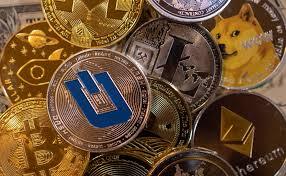What function do blockchain's decentralised autonomous organisations (DAOs) serve?
Explore the significant role of blockchain DAOs in . Learn how these organizations shape the future of blockchain technology.

The Role of Decentralized Autonomous Organizations (DAOs) in Blockchain
In the ever-evolving landscape of blockchain technology, Decentralized Autonomous Organizations (DAOs) have emerged as a revolutionary concept. These entities are reshaping traditional business models and governance structures, offering a glimpse into a more decentralized and transparent future. In this article, we will delve into the intricacies of DAOs and explore their pivotal role within the blockchain ecosystem.
Decentralized Autonomous Organizations, often referred to as DAOs, are essentially self-governing entities that operate on blockchain technology. Unlike traditional organizations with centralized decision-making structures, DAOs are autonomous and governed by code. They represent a fundamental shift from hierarchical models to decentralized, community-driven ecosystems.
The Foundation of Decentralization
At the core of DAOs is the principle of decentralization. Blockchain technology, the underlying foundation of DAOs, is known for its distributed ledger system. This means that data and transactions are not controlled by a single entity but are recorded across a network of computers, ensuring transparency and immutability.
How DAOs Operate
DAOs rely on smart contracts, self-executing agreements with the terms of the contract directly written into code. These contracts enable automatic decision-making based on predefined rules. DAO members, often token holders, vote on proposals within the organization, and the smart contracts execute actions accordingly.
Use Cases for DAOs
The versatility of DAOs extends to various industries. They can be utilized for crowdfunding, decentralized applications (DApps), decentralized finance (DeFi) protocols, and even as governance models for communities and projects. The potential applications are vast, making DAOs a powerful tool for innovation.
Advantages of DAOs
Transparency: All actions and decisions are recorded on the blockchain for public scrutiny.
Decentralization: Eliminates the need for intermediaries, reducing the risk of manipulation.
Accessibility: Anyone with internet access can participate in DAOs.
Security: Smart contracts ensure the enforcement of rules without the need for third-party intervention.
Challenges Faced by DAOs
While DAOs hold great promise, they are not without challenges. These include security vulnerabilities, decision-making disputes, and regulatory concerns. Overcoming these obstacles is crucial for the widespread adoption of DAOs.
DAOs and Smart Contracts
DAOs and smart contracts are intertwined. Smart contracts enable DAOs to execute tasks autonomously, ensuring that members' decisions are carried out precisely as intended. This level of automation enhances efficiency and trust within the organization.
DAO Governance
The governance structure of DAOs varies, with some being more decentralized than others. Major decisions, such as protocol upgrades or fund allocation, often require member voting. This democratic approach to governance is a hallmark of DAOs.
The Legal Aspect
The legal status of DAOs is a topic of ongoing debate. Regulators are still catching up with the technology, leading to uncertainty in various jurisdictions. DAOs must navigate this legal landscape to ensure compliance.
DAOs and Decentralized Finance (DeFi)
DAOs play a pivotal role in the booming DeFi sector. They govern DeFi protocols, making decisions on lending, borrowing, and liquidity provision. This synergy between DAOs and DeFi is driving innovation in the financial industry.
The Future of DAOs
The future of DAOs looks promising. As blockchain technology continues to evolve, DAOs are likely to become more sophisticated and adaptable. They could play a crucial role in shaping the future of digital governance.
Risks and Security Concerns
Despite their advantages, DAOs are not immune to risks. Security breaches and vulnerabilities in smart contracts can lead to significant losses. Ongoing security audits and robust development practices are essential to mitigate these risks.
Case Studies of Successful DAOs
Several DAOs have already made their mark in the blockchain space. Examples include "The DAO" and "MolochDAO," which have paved the way for innovative use cases and governance models.
Decentralized Autonomous Organizations represent a groundbreaking shift towards decentralized, community-driven governance models. Their role in blockchain technology extends across various industries, with the potential to revolutionize how we organize and govern in the digital age.
How to Secure Your Cryptocurrency Holdings from Physical Theft
In an era of digital currency dominance, protecting your cryptocurrency holdings from online threats is a top priority. However, what about the physical world? Physical theft of cryptocurrencies is a real concern for many investors. In this article, we will explore effective strategies and best practices to safeguard your digital assets from physical theft.
Cryptocurrencies have gained immense popularity in recent years, but with increased value comes increased risk. While cybersecurity is a significant concern, we often overlook the potential for physical theft. Criminals are becoming more inventive in their methods, making it essential for cryptocurrency holders to take proactive measures to protect their investments.
Understanding the Risks
Physical vs. Digital Threats
It's crucial to differentiate between digital and physical threats in the crypto world. Digital threats encompass hacking, phishing, and malware attacks, while physical threats involve the theft of physical items like hardware wallets, paper wallets, or even direct physical threats to owners.
Real-Life Stories of Crypto Theft
To grasp the severity of physical cryptocurrency theft, let's examine real-life incidents where investors faced significant losses due to inadequate security measures.
Securing Your Physical Space
Home Security Measures
Protecting your cryptocurrency starts at home. Implementing security measures such as alarms, cameras, and secure storage can deter potential thieves.
Safe Deposit Boxes
For added protection, consider renting a safe deposit box at your local bank to store valuable physical items related to your cryptocurrency holdings.
Hardware Wallets
Invest in hardware wallets that provide an extra layer of security by keeping your private keys offline and safe from physical tampering.
Personal Security
Personal Safety Tips
When discussing your crypto holdings, exercise caution and discretion to avoid drawing unnecessary attention to yourself.
Traveling with Cryptocurrency
Traveling with cryptocurrency requires extra care. Learn how to keep your digital assets secure while on the move.

















